Fleurs du Mal Magazine


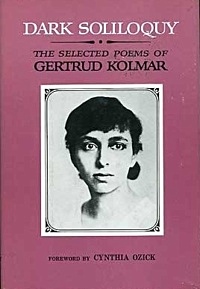
Sehnsucht
Ich denke dein,
Immer denke ich dein.
Menschen sprachen zu mir, doch ich achtet es nicht.
Ich sah in des Abendhimmels tiefes Chinesenblau, daran
der Mond als runde gelbe Laterne hing,
Und sann einem anderen Monde, dem deinen, nach,
Der dir glänzender Schild eines ionischen Helden vielleicht
oder sanfter goldener Diskus eines erhabenen Werfers wurde.
Im Winkel der Stube saß ich dann ohne Lampenlicht,
tagmüde, verhüllt, ganz dem Dunkel gegeben,
Die Hände lagen im Schoß, Augen fielen mir zu.
Doch auf die innere Wand der Lider war klein und unscharf
dein Bild gemalt.
Unter Gestirnen schritt ich an stilleren Gärten, den Schatten-
rissen der Kiefern, flacher, verstummter Häuser,
steiler Giebel vorbei
Unter weichem düsteren Mantel, den nur zuweilen
Radknirschen griff, Eulenschrei zerrte,
Und redete schweigend von dir, Geliebter, dem lautlosen,
dem weißen mandeläugigen Hunde, den ich geleitete.
Verschlungene in ewigen Meeren ertrunkene Nächte!
Da meine Hand in den Flaum deiner Brust sich bettete
zum Schlummer,
Da unsere Atemzüge sich mischten zu köstlichem Wein,
den wir in Rosenquarzschale darboten unserer Herrin,
der Liebe,
Da in Gebirgen der Finsternis die Druse uns wuchs und
reifte, Hohlfrucht aus Bergkristallen und fliedernen
Amethysten,
Da die Zärtlichkeit unsere Arme Feuertulpen
porzellanblaue Hyazinthen aus welligen, weiten, ins
Morgersgraun reichenden Schollen rief,
Da, auf gewundenem Stengel spielend, die halberschlossene
Knospe des Mohns wie Natter blutrot über uns züngelte,
Des Ostens Balsam- und Zimmetbäume mit zitterndem
Laube um unsere Lager sich hoben
Und purpurne Weberfinken unserer Munde Hauch in
schwebende Nester verflochten. –
Wann wieder werden wir in des Geheimnisses Wälder fliehn,
die, undurchdringlich, Hinde und Hirsch vor dem
Verfolger schützen?
Wann wieder wird mein Leib deinen hungrig bittenden
Händen weißes duftendes Brot, wird meines Mundes
gespaltene Frucht deinen dürstenden Lippen süß sein?
Wann wieder werden wir uns begegnen?
Innige Worte gleich Samen von Wurzkraut und Sommer-
blumen verstreun
Und beglückter verstummen, um nur die singenden
Quellen unseres Blutes zu hören?
(Fühlst du, Geliebter, mein kleines horchendes Ohr, ruhend
an deinem Herzen?)
Wann wieder werden im Nachen wir gleiten unter zitronfarbnem
Segel,
Von silbrig beschäumter, tanzender Woge selig gewiegt,
Vorüber an Palmen, die grüner Turban schmückt wie den
Sproß des Propheten,
Den Saumriffn ferner Inseln entgegen, Korallenbänken,
an denen du scheitern willst?
Wann wieder, Geliebter . . . wann wieder . . ? . .
Nun sintert mein Weg
Durch Ödnis. Dorn ritzt den Fuß.
Bäche, frische, erquickende Wasser, murmeln; aber ich finde
sie nicht.
Datteln schwellen, die ich nicht koste. Meine verschmachtende
Seele
Flüstert ein Wort nur, dies einzige:
»Komm. . .«
O komm …
Gertrud Kolmar
(1894-1943)
Gedicht: Sehnsucht
fleursdumal.nl magazine
More in: Archive K-L, Archive K-L, Kolmar, Gertrud
“The staggering thing about a life’s work is it takes a lifetime to complete,” Craig Morgan Teicher writes in these luminous essays.
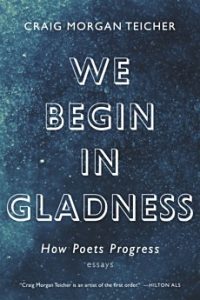 We Begin in Gladness considers how poets start out, how they learn to hear themselves, and how some offer us that rare, glittering thing: lasting work. Teicher traces the poetic development of the works of Sylvia Plath, John Ashbery, Louise Glück, and Francine J. Harris, among others, to illuminate the paths they forged—by dramatic breakthroughs or by slow increments, and always by perseverance.
We Begin in Gladness considers how poets start out, how they learn to hear themselves, and how some offer us that rare, glittering thing: lasting work. Teicher traces the poetic development of the works of Sylvia Plath, John Ashbery, Louise Glück, and Francine J. Harris, among others, to illuminate the paths they forged—by dramatic breakthroughs or by slow increments, and always by perseverance.
We Begin in Gladness is indispensable for readers curious about the artistic life and for writers wondering how they might light out—or even scale the peak of the mountain.
Though it seems, at first, like an art of speaking, poetry is an art of listening. The poet trains to hear clearly and, as much as possible, without interruption, the voice of the mind, the voice that gathers, packs with meaning, and unpacks the language the poet knows.
It can take a long time to learn to let this voice speak without getting in its way. This slow learning, the growth of this habit of inner attentiveness, is poetic development, and it is the substance of the poet’s art. Of course, this growth is rarely steady, never linear, and is sometimes not actually growth but diminishment—that’s all part of the compelling story of a poet’s way forward. —from the Introduction
Craig Morgan Teicher is an acclaimed poet and critic. He is the author of We Begin in Gladness: How Poets Progress, and three books of poetry, including The Trembling Answers, winner of the Lenore Marshall Poetry Prize, and he regularly writes reviews for Los Angeles Times, NPR, and the New York Times Book Review. He lives in New Jersey.
We Begin in Gladness.
How Poets Progress
by Craig Morgan Teicher
Publication Date 11/6/18
Format: Paperback
ISBN 978-1-55597-821-1
Subject: Literary Criticism
Pages 176
Graywolf Press
$16.00
# new books
more info: http://craigmorganteicher.com/
How Poets Progress
fleursdumal.nl magazine
More in: - Book Lovers, - Book Stories, Archive S-T, Archive S-T, Art & Literature News, Sylvia Plath, The Art of Reading
Nu Mels zelf grootvader is, lijkt het soms of hij zijn leven heeft gedroomd. Net als zijn moeder. Hij weet nog hoe ze zong terwijl ze frambozen plukte. Hij twijfelt aan de waarheid van de dingen die hij zich herinnert. Soms bleken ze achteraf heel anders. Hij herinnerde zich zijn vader als een groot man tegen wie hij opkeek, maar toen hij later in de kast de overjas van zijn vader vond en hem paste, bleek die hem te klein.
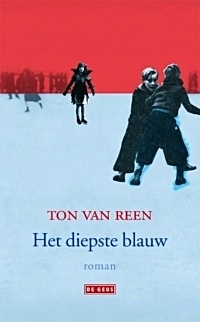 En zijn moeder? Was ze echt zo meisjesachtig? Jammer dat hij geen foto’s van haar heeft zoals hij zich haar herinnert, haar mond rood van frambozensap. Alle foto’s die hij van haar heeft zijn in zwart-wit.
En zijn moeder? Was ze echt zo meisjesachtig? Jammer dat hij geen foto’s van haar heeft zoals hij zich haar herinnert, haar mond rood van frambozensap. Alle foto’s die hij van haar heeft zijn in zwart-wit.
Daardoor missen ze ook de geuren die bij haar hoorden. Rijp fruit. Gras. Appelgebak. Hij bewaart een paar foto’s van haar in zijn portefeuille, samen met die van Tijger en Thija. Hij haalt ze te voorschijn, zoals hij bijna elke dag even doet. Zijn moeder, lachend, op het weitje achter het huis waar ze de was te bleken legt, een beetje verrast door de fotograaf. Was dat zijn vader geweest? Of haar eigen vader, grootvader Bernhard?
Een andere foto toont haar op haar paasbest, samen met zijn vader, in het zwart, de voordeur achter zich dichttrekkend. Op weg naar de kerk. In dat grijs is ze veel te deftig voor de moeder uit zijn herinnering. De zondagse kleren zitten haar zelfs op de foto onwennig. Na de mis gooide ze die altijd direct uit, om wat luchtigs aan te trekken, om de bossen in te gaan, samen met Mels en vaak ook met Tijger en Thija. Maar altijd zonder vader. Die zat op zondag in zijn zwarte kleren deftig zondags te wezen in het café.
Of gewoon in de kamer, slapend in zijn stoel. Niet voor niets was hij een zoon van grootvader Rudolf. Hij stond stijf van de regels.
Een foto waar ze allemaal op staan: grootvader Bernhard, moeder, Thija, Tijger en hijzelf. Geen vader. Allemaal tot de knieën in een zee van gras aan de oever van de Wijer. Toen was zijn vader er nog. De foto moet door hem genomen zijn. Hij moet nog hebben geprobeerd de compositie van de foto te redden, maar daarbij heeft hij het hele groepje een beetje scheef gefotografeerd.
Of misschien was hij gewoon dronken, zoals vaak op zondag. De Wijer stroomt in de richting van de brug een beetje omhoog, net alsof ze allemaal wankel staan. Thija staat vooraan, met opgeschorte jurk, bang dat haar onderrok onder het stuifmeel van de oeverlelies komt te zitten. Haar benen dun, maar sterk. Alles aan haar is sterk. Haar lach, haar houding. Hoe klein en spichtig ze ook is, niemand is altijd en overal zo nadrukkelijk aanwezig als zij. Tijger staat naast haar, een arm om haar hals. Hij trekt haar een beetje naar zich toe. Zelf staat Mels vlak bij zijn moeder, die troostend een hand op zijn schouder legt.
Een foto van Tijger alleen, stoer, in starthouding op zijn fiets, als op een motor.
En de adembenemend mooie foto van Thija op de dag van haar plechtige communie. Voor de bloementuin van de kerk. In haar roze jurk, die zelfs op de zwartwitfoto, in de speciale tint grijs, laat zien hoe roze die is. In haar hand draagt ze een boeket van margrieten en Gipskruid, in haar andere hand het nieuwe missaal. Haar ogen staan groot, maar voor haar doen wat verlegen. Ze vertolkt de hoofdrol in een toneelstuk. Het hele dorp was erbij toen alle communicanten, een voor een, door de fotograaf werden gekiekt, allemaal in dezelfde houding, voor de bloementuin tussen de kerk en de pastorie.
Nog altijd herinnert Mels zich dat moment. Hoe stil het werd; het was al stil toen ze naar de plek liep. De ogen waarmee ze naar de fotograaf keek, haar grote wat verbaasde ogen. Het bleef maar duren. Ze trok het toneelstuk helemaal naar zich toe. Maar de fotograaf moest verder. Andere meisjes stonden te dringen.
Mels weet nog precies hoe het was; hoe ze hem heel even aankeek. Maar later zei Tijger dat ze naar hem had gekeken en zo had iedereen gedacht dat ze naar hem of naar haar keek, zelfs zijn moeder.
Hij stopt de foto’s terug in de portefeuille en kijkt uit over de Wijer die er, vanaf dit punt gezien, nog net zo bij ligt als een halve eeuw geleden.
Ton van Reen: Het diepste blauw (080)
wordt vervolgd
fleursdumal.nl magazine
More in: - Book News, - Het diepste blauw, Archive Q-R, Reen, Ton van
Absurdités, dérives, abus et même maltraitances ont jalonné l’histoire de la folie.
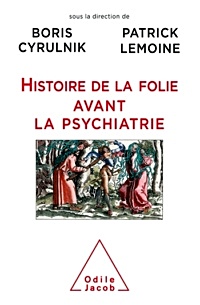 Comment comprendre autrement le succès de Mesmer et de son baquet ? Comment rendre compte de l’attribution à Saturne des troubles de l’humeur et au démon des tourments de l’âme ? Comment justifier l’enfermement psychiatrique des dissidents sous Staline ?
Comment comprendre autrement le succès de Mesmer et de son baquet ? Comment rendre compte de l’attribution à Saturne des troubles de l’humeur et au démon des tourments de l’âme ? Comment justifier l’enfermement psychiatrique des dissidents sous Staline ?
Entourés d’une dizaine d’experts – des psychiatres mais aussi une historienne, un interniste ou un neurologue – Patrick Lemoine et Boris Cyrulnik débattent du passé de la psychiatrie. Ils nous proposent de nous concentrer sur quelques questions très actuelles et pour le moins épineuses : quelle nécessité de fonder une nouvelle psychiatrie aujourd’hui, et quel avenir pour cette discipline, longtemps branche folle de la médecine ?
Boris Cyrulnik est neuropsychiatre et directeur d’enseignement à l’université de Toulon. Il est l’auteur de très nombreux ouvrages qui ont tous été des best-sellers, parmi lesquels, tout récemment, Psychothérapie de Dieu qui est un immense succès.
Patrick Lemoine est psychiatre. Spécialiste du sommeil, docteur en neurosciences, professeur associé à l’Université de Pékin, il a publié plus d’une trentaine d’ouvrages, parmi lesquels Le Mystère du placebo.
Avec Patrick Clervoy, Jean Furtos, Jacques Hochmann, Danielle Jacquart, Pierre Lamothe, Pierre Lemarquis, Stéphane Mouchabac, Gérard Ostermann.
Boris Cyrulnik & Patrick Lemoine
Histoire de la folie avant la psychiatrie
Édition brochée
12 septembre 2018
256 pages
EAN13 : 9782738145130
145 x 220 mm
Éditions Odile Jacob
€ 23.90
# new books
Boris Cyrulnik & Patrick Lemoine
fleursdumal.nl magazine
More in: - Book News, - Book Stories, Archive C-D, Archive K-L, Psychiatric hospitals
For the bicentennial of its first publication, Mary Shelley’s original 1818 text, introduced by National Book Critics Circle award-winner Charlotte Gordon. Nominated as one of America’s best-loved novels by PBS’s The Great American Read.
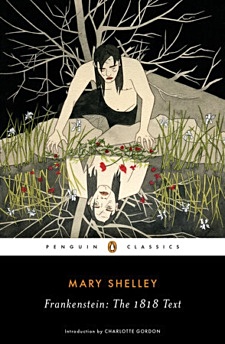 2018 marks the bicentennial of Mary Shelley’s seminal novel. For the first time, Penguin Classics will publish the original 1818 text, which preserves the hard-hitting and politically-charged aspects of Shelley’s original writing, as well as her unflinching wit and strong female voice. This edition also emphasizes Shelley’s relationship with her mother—trailblazing feminist Mary Wollstonecraft, who penned A Vindication of the Rights of Woman—and demonstrates her commitment to carrying forward her mother’s ideals, placing her in the context of a feminist legacy rather than the sole female in the company of male poets, including Percy Shelley and Lord Byron.
2018 marks the bicentennial of Mary Shelley’s seminal novel. For the first time, Penguin Classics will publish the original 1818 text, which preserves the hard-hitting and politically-charged aspects of Shelley’s original writing, as well as her unflinching wit and strong female voice. This edition also emphasizes Shelley’s relationship with her mother—trailblazing feminist Mary Wollstonecraft, who penned A Vindication of the Rights of Woman—and demonstrates her commitment to carrying forward her mother’s ideals, placing her in the context of a feminist legacy rather than the sole female in the company of male poets, including Percy Shelley and Lord Byron.
This edition includes a new introduction and suggestions for further reading by National Book Critics Circle award-winner and Shelley expert Charlotte Gordon, literary excerpts and reviews selected by Gordon, and a chronology and essay by preeminent Shelley scholar Charles E. Robinson.
Mary Shelley: The daughter of Mary Wollestonecraft, the ardent feminist and author of A Vindication on the Right of Women, and William Godwin, the radical-anarchist philosopher and author of Lives of the Necromancers, Mary Goodwin was born into a freethinking, revolutionary household in London on August 30,1797. Educated mainly by her intellectual surroundings, she had little formal schooling and at 16 eloped with the young poet Percy Bysshe Shelley; they eventually married in 1816. Mary Shelley’s life had many tragic elements. Her mother died giving birth to Mary; her half-sister committed suicide; Harriet Shelley (Percy’s wife) drowned herself and her unborn child after he ran off with Mary. William Godwin disowned Mary and Shelley after their elopement, but—heavily in debt—recanted and came to them for money; Mary’s first child died soon after its birth; and in 1822 Percy Shelley drowned in the Gulf of La Spezia—when Mary was not quite 25. Mary Shelley recalled that her husband was “forever inciting” her to “obtain literary reputation.” But she did not begin to write seriously until the summer of 1816, when she and Shelley were in Switzerland, neighbor to Lord Byron. One night following a contest to compose ghost stories, Mary conceived her masterpiece, Frankenstein. After Shelley’s death she continued to write Valperga (1823), The Last Man (1826), Ladore (1835), and Faulkner (1837), in addition to editing her husband’s works. In 1838 she began to work on his biography, but owing to poor health she completed only a fragment. Although she received marriage proposals from Trelawney, John Howard Payne, and perhaps Washington Irving, Mary Shelley never remarried. “I want to be Mary Shelley on my tombstone,” she is reported to have said. She died on February 1, 1851, survived by her son, Percy Florence.
For more than seventy years, Penguin has been the leading publisher of classic literature in the English-speaking world. With more than 1,800 titles, Penguin Classics represents a global bookshelf of the best works throughout history and across genres and disciplines. Readers trust the series to provide authoritative texts enhanced by introductions and notes by distinguished scholars and contemporary authors, as well as up-to-date translations by award-winning translators.
Frankenstein: The 1818 Text
By Mary Shelley
Introduction by Charlotte Gordon
Contribution by Charlotte Gordon
Fiction Classics
Paperback
Penguin Random House
Published by Penguin Classics
Jan 16, 2018
288 Pages
ISBN 9780143131847
$10.00
# new books
Frankenstein – Mary Shelley
fleursdumal.nl magazine
More in: - Book Lovers, - Book News, Archive S-T, Art & Literature News, Mary Shelley, Shelley, Mary, Tales of Mystery & Imagination
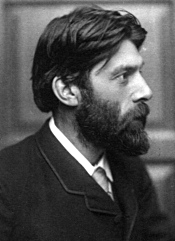
To Joseph Joachim
Belov’d of all to whom that Muse is dear
Who hid her spirit of rapture from the Greek,
Whereby our art excelleth the antique,
Perfecting formal beauty to the ear;
Thou that hast been in England many a year
The interpreter who left us nought to seek,
Making Beethoven’s inmost passion speak,
Bringing the soul of great Sebastian near.
Their music liveth ever, and ’tis just
That thou, good Joachim, so high thy skill,
Rank (as thou shalt upon the heavenly hill)
Laurel’d with them, for thy ennobling trust
Remember’d when thy loving hand is still
And every ear that heard thee stopt with dust.
Robert Bridges
(1844-1930)
To Joseph Joachim
fleursdumal.nl magazine
More in: *War Poetry Archive, Archive A-B, Bridges, Robert
Literary and music group Feest der Poëzie brings a theatrical lecture on the life and work of Oscar Wilde and one of his favorite beverages – absinthe. This Saturday at the Pianola Museum, 8.30 PM.

Immerse yourself in the story of one of the best-loved writers in the English language with prose, poetry, songs and drama by Oscar Wilde and his contemporaries, on a journey through his rise and fall.
Poet and absintheur David Kwa will demonstrate the absinthe ritual and read manifold roles, such as that of the dreaded Marquess of Queensberry.
Daan van de Velde (piano) and Susanne Winkler (soprano) will perform Irish and English art songs, as performing poet Simon Mulder takes on the roles of narrator and Oscar Wilde (indeed, wearing a contemporary pair of silk breeches) in the fascinating story of his life.
Also, Van de Velde and Mulder will bring the very special performance of a long lost work for piano and voice on Wilde’s ‘Ballad of Reading Gaol’ by early 20th century composer Henri Zagwijn.
The Poetry Bar will bring you carefully prepared absinthe, along with a decadent sonnet.
Saturday the 24th of November 2018
venue open: 8 PM
start: 8.30PM
(English spoken)
venue:
Pianola Museum
Westerstraat 116
Amsterdam
Tickets: € 15/12.50
www.feestderpoezie.nl
trailer: www.youtube.com/watch?v=-V6yx3X8rwg
Music, stories, absinthe and more during ‘The Green Hour’ with Oscar Wilde
fleursdumal.nl magazine
More in: # Music Archive, Archive M-N, Archive W-X, Art & Literature News, Literary Events, THEATRE, Wilde, Oscar, Wilde, Oscar
Je zou kunnen zeggen dat Fantoommerrie verder gaat waar Kalfsvlies was opgehouden, maar dat suggereert dat we met een vervolg te maken hebben, en dat is niet zo.
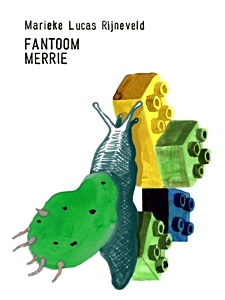 Deze bundel is een nieuwe verkenning in het universum van Rijneveld, dat paradoxaal genoeg aan de ene kant compleet onnavolgbaar is, maar aan de andere kant ook onmiddellijk herkenbaar en altijd eigen.
Deze bundel is een nieuwe verkenning in het universum van Rijneveld, dat paradoxaal genoeg aan de ene kant compleet onnavolgbaar is, maar aan de andere kant ook onmiddellijk herkenbaar en altijd eigen.
Over een oma die onsterfelijk had moeten zijn, het noodlottig einde van een onvoorzichtige kat, over dromen natuurlijk: mooie en lelijke, over bidden om speelgoed, de zithouding van de schrijver – en over voorleesvaders, die lastige vragen krijgen: ‘waar komen kinderen vandaan als ouders nooit kussen?’
Fantoommerrie is een dichtbundel om in te verdwalen, en dan te besluiten om er te blijven.
Marieke Lucas Rijneveld (1991) geldt als een van de grootste talenten van de Nederlandse letteren. In 2015 debuteerde ze met de meermaals herdrukte dichtbundel ‘Kalfsvlies’, die werd bekroond met de C. Buddingh’ Prijs voor het beste poëziedebuut. In ‘de Volkskrant’ werd ze vervolgens uitgeroepen tot literair talent van het jaar.
Haar indrukwekkende voordracht was veelvuldig te horen op literaire podia als Crossing Border, De Jonge Schrijversavond en de Nacht van de Poëzie, en haar gedichten en verhalen verschenen in een groot aantal literaire tijdschriften, waaronder ‘Hollands Maandblad’, ‘VPRO Gids’ en ‘De Revisor’.
Rijneveld groeide op in een gereformeerd boerengezin in Noord-Brabant en woont tegenwoordig in Utrecht, de stad die haar in 2015 het C.C.S. Cronestipendium toekende. Naast haar bestaan als schrijver werkt ze op een melkveebedrijf. Haar debuutroman ‘De avond is ongemak’ verscheen in 2018 en in januari 2019 verschijnt haar tweede dichtbundel ‘Fantoommerrie’.
Marieke Lucas Rijneveld:
Fantoommerrie
Gedichten
Fantoommerrie is de Tweede dichtbundel
van Marieke Lucas Rijneveld.
Wordt verwacht op 24 januari 2019
Bundel is te reserveren bij de boekhandel
Uitgeverij Atlas Contact.
ISBN 9789025453459
Pagina’s 64
Type Paperback / softback
€ 19,99
# new books
Marieke Lucas Rijneveld:
Fantoommerrie. Gedichten
fleursdumal.nl magazine
More in: - Book News, - Bookstores, Archive Q-R, Archive Q-R, Art & Literature News, Marieke Lucas Rijneveld, Rijneveld, Marieke Lucas

Het Wintertuinfestival, dat van 20 tot en met 25 november 2018 plaatsvindt in Nijmegen, gaat dit jaar over de vraag: Wat horen we als we luisteren? Tientallen schrijvers, dichters, wetenschappers, muzikanten en kunstenaars gaan in op dit thema. Zowel grote literaire namen als aanstormende talenten reizen af naar Nijmegen.
20 t/m 25 november: Wintertuinfestival Nijmegen
# meer info wintertuinfestival
fleursdumal.nl magazine
More in: # Music Archive, #More Poetry Archives, - Book Lovers, - Bookstores, Art & Literature News, THEATRE, Wintertuin Festival
La linguiste Marie Treps retrace l’histoire des insultes racistes dans Maudits mots.
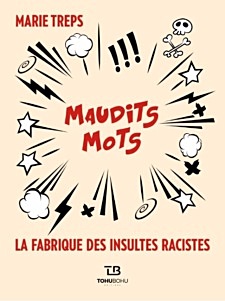 La linguiste effectue un inventaire des insultes racistes au fil du temps, à partir de citations issues de textes anciens ou contemporains. Elle retrace les circonstances historiques dans lesquelles elles ont été imaginées ainsi que les motivations.
La linguiste effectue un inventaire des insultes racistes au fil du temps, à partir de citations issues de textes anciens ou contemporains. Elle retrace les circonstances historiques dans lesquelles elles ont été imaginées ainsi que les motivations.
“Maudits” mots fournit un inventaire détaillé des termes et des expressions produits, au cours de notre histoire, par la xénophobie ordinaire ou par le racisme exacerbé.
Marie Treps dissèque les multiples insultes adressées aux Allemands, aux Arabes, aux Asiatiques, aux Espagnols, aux Italiens, aux Juifs, et à bien d’autres groupes ainsi réduits à l’état de stéréotypes, voire déshumanisés.
En linguiste et en sémiologue, Marie Treps ausculte tout un lexique qui vise à dégrader, à stigmatiser, à outrager, qui est parfois naïf, faussement affectueux, ou qui se donne une apparence scientifique. L’analyse s’appuie sur des textes anciens et contemporains, dont beaucoup appartiennent à la littérature.
Linguiste et sémiologue, Marie TREPS a publié une quinzaine d’ouvrages consacrés à la langue française, notamment, Les Mots voyageurs, Seuil, 2003 ; Les Mots migrateurs, Seuil, 2009 ; Les Mots-caresses, CNRS Editions, 2011 ; Oh là là, ces Français ! La Librairie Vuibert, 2015.
Marie Treps:
Maudits mots. La fabrique des insultes racistes
Broché: 327 pages
Editeur: Tohu-Bohu éditions
Collection: TOHU BOHU
Langue: Français
2017
ISBN : 978-2-37622-012-1
Dimensions: 15 x 20 cm
€ 20,00
# new books
Maudits mots.
La fabrique des insultes racistes
fleursdumal.nl magazine
More in: - Book News, - Book Stories, Archive S-T, Art & Literature News, CRIME & PUNISHMENT, MONTAIGNE, Racism
Auch hundert Jahre nach seinem Tod ein Geheimnis: Georg Trakl. Rüdiger Görner geht dem Mythos nach.
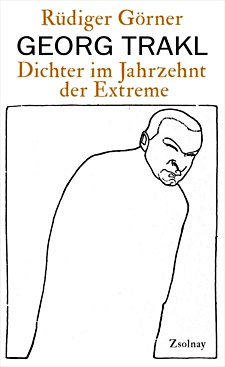 Kurz nach Ausbruch des Ersten Weltkriegs starb Georg Trakl in einem Militärspital an einer Überdosis Kokain. Ob der im Krieg traumatisierte Dichter Selbstmord beging, ist eines der Rätsel, die sein Leben und Werk umgeben.
Kurz nach Ausbruch des Ersten Weltkriegs starb Georg Trakl in einem Militärspital an einer Überdosis Kokain. Ob der im Krieg traumatisierte Dichter Selbstmord beging, ist eines der Rätsel, die sein Leben und Werk umgeben.
Rüdiger Görner gelingt es, sich den biographischen Brüchen und Details über das Werk anzunähern. Er geht in der Auseinandersetzung mit den Gedichten der Todessehnsucht Trakls, der mehr als innigen Beziehung zu Schwester Margarethe und dem Aufwachsen in Salzburg nach. Und kommt zu faszinierenden Schlüssen: Dass sich die Extreme der Zeit – die Beschleunigung der Lebensverhältnisse, ihre rücksichtslose Technisierung – im Werk des Dichters nur bedingt spiegeln. Und dass die Gedichte – Trakls Ruhelosigkeit zum Trotz – oft geradezu ausgeruht klingen.
Rüdiger Görner, geboren 1957 in Rottweil, ist Professor für Neuere Deutsche und vergleichende Literatur an der Queen Mary University of London. Gründer des Ingeborg Bachmann Centre for Austrian Literature und Gründungsdirektor des Centre for Anglo-German Cultural Relations. Träger des Deutschen Sprachpreises, des Reimar Lüstpreises der Alexander von Humboldt-Stiftung und des Verdienstordens der Bundesrepublik Deutschland. Bei Zsolnay erschienen Rainer Maria Rilke. Im Herzwerk der Sprache (2004), Georg Trakl. Dichter im Jahrzehnt der Extreme (2014) und Oskar Kokoschka. Jahrhundertkünstler (2018).
Rüdiger Görner:
Georg Trakl.
Dichter im Jahrzehnt der Extreme
Deutscher Sprache
Fester Einband
352 Seiten
Zsolnay / Deuticke
Carl Hanser Verlag, München
ISBN 978-3-552-05697-8
2014
€ 24,90
# new books
Georg Trakl
fleursdumal.nl magazine
More in: - Book News, - Book Stories, Archive G-H, Archive S-T, Art & Literature News, Opium-Eaters, Trakl, Georg, Trakl, Georg
Het schuurtje achter het huis van grootvader Rudolf is een klein oorlogsmuseum. Er staan een paar ingevette geweren van Duitsers en Engelsen. Militaire uitrustingen. Helmen. Blinkend opgepoetste koperen hulzen van granaten.
 De helm van vliegenier John Wilkington heeft een apart plaatsje onder een glazen stolp. Daarnaast ligt een handgeschreven vel met de informatie die grootvader over het leven van John Wilkington bij elkaar heeft gezocht. En een carbonkopie van de getypte brief die grootvader naar Engeland heeft gestuurd, waarin hij de laatste weken van het leven van Wilkington heeft beschreven.
De helm van vliegenier John Wilkington heeft een apart plaatsje onder een glazen stolp. Daarnaast ligt een handgeschreven vel met de informatie die grootvader over het leven van John Wilkington bij elkaar heeft gezocht. En een carbonkopie van de getypte brief die grootvader naar Engeland heeft gestuurd, waarin hij de laatste weken van het leven van Wilkington heeft beschreven.
Daar heeft hij een dankbrief voor teruggekregen van een majoor Kirk Harlewood, die hem ook het thuisadres van Wilkington heeft gegeven. Waarna zijn schoondochter, Mels’ moeder, bij wie Wilkington in huis was geweest, een brief naar de weduwe heeft gestuurd. Met grootvaders toestemming, omdat hij zelf niet in staat was om emoties op papier te zetten.
Verder bevat het museum veel foto’s in lijstjes. Vooral kiekjes van vrolijke Engelse tommy’s, boven op tanks en in jeeps, met meisjes met opgetrokken rokken op schoot. Door al die vrolijke soldaten en glunderende meisjes lijkt de oorlog vooral op een groot feest.
Bij sommige meisjes heeft grootvader een kruisje op het voorhoofd gezet.
`Waar dient dat kruisje voor?’ vraagt Mels, die de gezichten van de meisjes bestudeert.
`Het is een brandmerk’, zegt grootvader. `Het waren meiden die met Duitse soldaten liepen en later met de tommy’s. Het betekende dat ze voor onze eigen jongens afgeschreven waren. Maar ze trouwden het eerst. Het geheugen van de mensen is kort. De oorlog waren we vlug vergeten.’
`Waarom bewaart u die spullen dan?’
`Omdat ik wil onthouden waar wij angst voor hebben gehad.’
Ton van Reen: Het diepste blauw (079)
wordt vervolgd
fleursdumal.nl magazine
More in: - Book News, - Het diepste blauw, Archive Q-R, Reen, Ton van
Thank you for reading Fleurs du Mal - magazine for art & literature